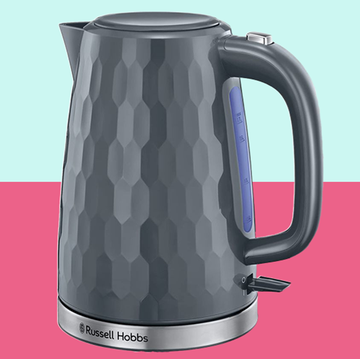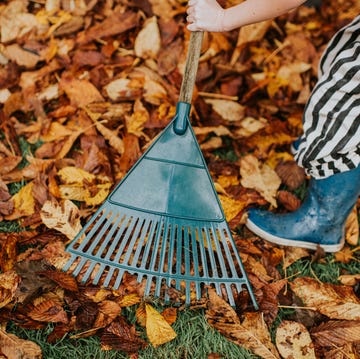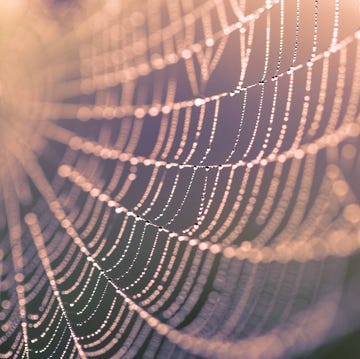What you get up to in your bedroom is entirely your business. But some dirty habits could be keeping you up all night – I’m talking about cleaning and hygiene, of course. Why, what were you thinking?
Turns out, there’s a scarily long list of bad bedroom habits we all fall into. From eating under the covers to tossing damp towels on the bed, our cosy sanctuaries might secretly be harbouring all sorts of germs, often thanks to us.
As always, I’m here to gently (and lovingly) tell you what you’re doing wrong. I spoke to Anne Marie Boyhan, certified sleep science coach, insomnia expert, founder of The Sleep Care Company and DFS’ resident sleep expert, to find out how our bedroom habits might be sabotaging our shuteye.
What to read next
“Studies have shown that air pollution and allergens in the home are linked to shorter sleep duration, difficulty falling asleep, and more awakenings,” says Anne Marie. “Dust mites and mould spore can inflame the respiratory system and interfere with deep sleep phases. Clean air, a mould free home and regular laundering of bedding isn’t just about comfort — it’s essential for our sleep health.”
Filthy bedroom habits to break now
We spend an average of 27 years of our lives in bed. Yes, that stat helps sell mattresses, but it also means we should probably care a little more about the space we’re spending so much time in. Keeping it cool, calm and (most importantly) clean might just be the secret to better sleep.
“The state of your bedroom directly affects how safe and calm your body feels,” Anne Marie explains. “A cluttered room can increase cortisol levels, which is the stress hormone that interferes with melatonin production and makes it harder to fall or stay asleep.”
So without further ado, here are the grubby bedtime habits to kick now.
1. Leaving wet towels on the bed
We’ve all done it. You hop out of the shower, towel wrapped around you, and flop on the bed for a quick scroll—or chuck your damp towel on the duvet mid-getting-ready chaos. It feels harmless. It’s not.
Damp towels carry microbes, dead skin cells and dirt, which can transfer to your bedding, leading to bacteria build-up and even mould. Moisture-loving germs also irritate your skin and cause breakouts.
“20–25% of the population are genetically predisposed to have trouble detoxing mould spores, which can trigger a chronic inflammatory condition called CIRS (Chronic Inflammatory Response Syndrome). This is an often overlooked cause of insomnia that I see regularly in my clients,” warns Anne Marie.
If you suspect mould in your room, she says: “To clean it— wear a mask while cleaning visible mould with a professional-grade mould remover (e.g., hydrogen peroxide-based).” Improve ventilation and consider investing in an air purifier with a HEPA-grade filter.
2. Eating in bed
Guilty as charged. There’s nothing like a bedtime snack… except there really is, because it can mess up both your digestion and your sleep.
Eating in bed creates associations between your bed and, well, not sleeping—confusing your brain into staying alert. Plus, lying down to eat increases your chances of indigestion and acid reflux.
Oh, and crumbs? A pest party waiting to happen. Ants, cockroaches, and even mice can sniff out your late-night snacks. Bon appétit!
3. Not washing your pillowcases
Hopefully, we’re all washing our bedding every two weeks—but pillowcases? They might need more attention. More regular cleaning is recommended if you’re prone to breakouts, have sensitive skin, or fake tan regularly (guilty again). Personally, I aim for once a week.
Your pillowcase collects sweat, oil, dead skin cells and hair every single night. This cocktail breeds bacteria and allergens, which can lead to acne and skin irritation.
“This can result in more frequent awakenings or lower sleep quality overall. I recommend washing sheets weekly and using pillow protectors and mattress covers that are cleaned regularly too,” advises Anne Marie.
“One tip: wash your sheets with a natural detergent and finish with a toxin-free linen mist as a pre-bed ritual — it’s small but psychologically powerful.”
4. Hibernating in your dressing gown
Our favourite cuddle buddy might be missing out on a wash or two. Much like our slippers, these cosy items somehow always fail to make it into the washing, often because we’re wearing them at the time. Cosy? Yes. Clean? Maybe not.
They absorb body oils, sweat and shower moisture, not to mention dirt from whatever they touch. I toss mine in with the towels to keep it in regular rotation.
5. Sitting on the bed in outdoor clothes
My personal pet peeve. If you’ve been on a packed train or trudging through the city, and then sit on my bed in your “outside clothes”? No. Just no.
Our clothes pick up germs, bacteria, pollen, and pollution throughout the day—none of which belong in bed. I have affectionately coined this in my personal life as “The London Tube Bum”. Strip off your streetwear and switch to clean loungewear when you get home.
6. Ignoring your sleep mask
Sleep masks absorb oil, sweat, skincare residue—and all of that builds up fast. You should be washing them at least once a week (more if you wear them daily or have sensitive skin).
Cotton masks can go in the wash; silk ones should be hand washed to preserve the fibres. If it’s mulberry silk, a delicate cycle should be fine, according to sleep mask experts Drowsy.
7. Making the bed too soon
As someone who proudly makes the bed first thing, this one stung. But apparently, it’s not always the best move.
We lose about half a pint of water overnight. Some through breath, much through sweat. Making the bed immediately traps all that moisture inside, which can seep into your mattress and invite mould.
The fix? Pull back the duvet and let your bed breathe for 30 minutes before making it. A mattress protector helps too—and remember to open windows for airflow.
8. Co-sleeping with your pet
I know, I know. The snuggles are irresistible. And Anne Marie even admits there can be benefits like anxiety relief. But it’s still not the cleanest habit.
Pets bring in pollen, dirt, and faecal bacteria—no matter how clean they look. Their fur sheds dander and allergens, which can trigger sneezing, skin irritation or asthma symptoms. Not to mention the sleep disruption from their midnight movements.
“If you're waking frequently or feel tired despite 8 hours in bed, try letting your pet sleep in their own cosy dog bed nearby instead,” suggests Anne Marie. “I have a new puppy, Maui the cockapoo, who has been waking with the sun at 5:30am and the cause of lack of sleep in our home right now!” So she understands the tussle.
9. Tucking filthy phones under pillows
We all know our phones are disgusting. Known to play host to more bacteria than a toilet seat, and yet we tuck them under our pillows like a cold-hard electronic cuddly toy.
Aside from being germ bombs, phones emit blue light, which mimics daylight and tricks our brains into wakefulness.
“Scrolling on phones in bed, working from bed, bright overhead lighting late at night—it’s all sending the wrong signals to the brain," says Anne Marie. “Your bedroom should be a sanctuary for sleep and snuggles only, not a multi-functional space. We need to associate our bed with sleep only.”
Experts recommend switching off screens one-two hours before bedtime. Bonus: no germs in bed, either.
10. Forgetting dust spots
Even if you do clean regularly, are you hitting every hidden spot? “Stale air, dust, or poor ventilation can lead to respiratory irritation and lighter, more fragmented sleep,” Anne Marie warns.
Dust affects sleep by inflaming allergies and respiratory conditions like asthma. Make sure you’re cleaning the overlooked bits—headboards, blinds, under the bed, inside radiators—and yes, your fan blades too (especially in summer, unless you fancy a face full of flying fluff).
So there you have it. A cleaner bedroom = better sleep. You don’t need a total overhaul—just a few habit tweaks to keep things fresh, breathable, and blissfully undisturbed. Your future well-rested self will thank you.























